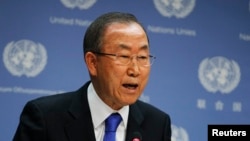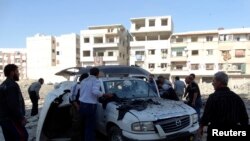U.N. Secretary-General Ban Ki-moon is calling for a 100-person joint mission to oversee the destruction of Syria's chemical weapons program, an extremely hazardous task he said would be made even more dangerous by continued fighting in an active war zone.
Underlining his concerns, Syrian government war planes Tuesday launched airstrikes against opposition forces in northwestern Idlib province, pushing back against a rebel operation targeting two key military bases there.
In a letter to the U.N. Security Council, Ban said the mission would be jointly staffed by personnel from the United Nations and The Hague-based Organization for the Prohibition of Chemical Weapons. The team would be based in Damascus with a staging and training base in Cyprus.
OPCW Head Ahmet Uzumcu said Tuesday that Syria had made "a constructive beginning for what will nonetheless be a long and difficult process." He said the global chemical weapons watchdog would send a second team to Syria to bolster its efforts.
Ban said the international community's aim of destroying Syria's chemical weapons program by mid-2014 will require "an operation the likes of which, quite simply, have never been tried before," with greater operational and security risks because of the speed required.
He also said that "without sustained, genuine commitment by the Syrian authorities, the joint mission will fail in its objectives."
OPCW experts are already overseeing work in Syria to dismantle chemical weapons production equipment. That is due to be completed by November 1. The final stage involves destroying Syria's existing 1,000-metric ton chemical arsenal.
Ban's plan would keep OPCW experts leading the technical part of the mission inspecting facilities and overseeing Syria's demolition efforts. United Nations staff would coordinate with the Syrian government and opposition, while handling security, logistics and communications.
The mission would need the approval of the Security Council, which is due to discuss the proposal later this week.
The team would be deployed for less than a year, with a multi-phase plan for ridding Syria of chemical weapons by the middle of 2014 as outlined in a Security Council resolution last month.
Underlining his concerns, Syrian government war planes Tuesday launched airstrikes against opposition forces in northwestern Idlib province, pushing back against a rebel operation targeting two key military bases there.
In a letter to the U.N. Security Council, Ban said the mission would be jointly staffed by personnel from the United Nations and The Hague-based Organization for the Prohibition of Chemical Weapons. The team would be based in Damascus with a staging and training base in Cyprus.
OPCW Head Ahmet Uzumcu said Tuesday that Syria had made "a constructive beginning for what will nonetheless be a long and difficult process." He said the global chemical weapons watchdog would send a second team to Syria to bolster its efforts.
Ban said the international community's aim of destroying Syria's chemical weapons program by mid-2014 will require "an operation the likes of which, quite simply, have never been tried before," with greater operational and security risks because of the speed required.
He also said that "without sustained, genuine commitment by the Syrian authorities, the joint mission will fail in its objectives."
OPCW experts are already overseeing work in Syria to dismantle chemical weapons production equipment. That is due to be completed by November 1. The final stage involves destroying Syria's existing 1,000-metric ton chemical arsenal.
Ban's plan would keep OPCW experts leading the technical part of the mission inspecting facilities and overseeing Syria's demolition efforts. United Nations staff would coordinate with the Syrian government and opposition, while handling security, logistics and communications.
The mission would need the approval of the Security Council, which is due to discuss the proposal later this week.
The team would be deployed for less than a year, with a multi-phase plan for ridding Syria of chemical weapons by the middle of 2014 as outlined in a Security Council resolution last month.






